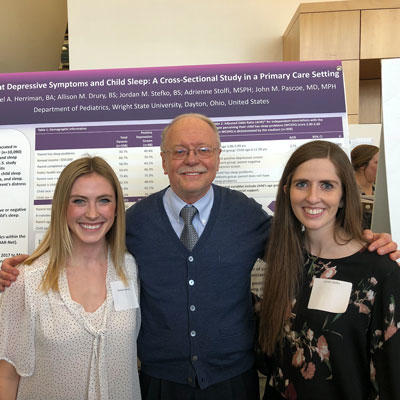Vital Signs » Summer 2018

A pair of students from the Wright State University Boonshoft School of Medicine completed a study into the sleep patterns of children and the associated mental health of their parents. The results of the first-of-its-kind effort may have beneficial effects on pediatric care in Southwest Ohio and beyond.
The project’s leaders hope that the findings of the investigation will cause clinicians to take mental health of parents into consideration when they’re treating preschool-age and younger children.
The effort began with the guidance of John Pascoe, M.D., M.P.H., professor of pediatrics at the medical school and director of pediatric health services.
“We wanted to look at child sleep patterns and different metrics, quantitative and qualitative, of how children sleep and how that relates to parent depression,” said Rachael Herriman, a second-year medical student from Cortland, Ohio, who helped lead the research. “We thought it would be interesting to look at the dynamics between parents’ well-being, depression, things like that, and how they are related to child sleep.”
Herriman, who has a budding interest in pediatrics, met with Pascoe early during her first year. She wanted to know how she could get involved. He had this project in the works for some time, and Herriman joined the effort with Jordan Stefko, a second-year medical student from Canfield, Ohio.
The researchers partnered with the Southwestern Ohio Ambulatory Research Network (SOARNET), a cohort of care clinics in the region that also includes doctors from Dayton Children’s Hospital and others. With the help of undergraduate student assistants, they were able to distribute surveys to parents and legal guardians in the waiting rooms of SOARNET clinics.
“Because we did it this way, we actually had 598 respondents. We threw a fairly wide net, but we narrowed it to solely parents or legal guardians because we wanted to make sure the assessment was more accurate,” Herriman said. “The number of parents we had ended up being 338.”
The parents filled out the Wisconsin Abbreviated Children’s Sleep Habits Questionnaire. The standardized assessment tool was developed and has been widely used for a lot of different studies assessing child sleep. It asks parents to consider if their children take naps, wake up in the middle of the night, or sleep in the same bed, among other things.
For the parents themselves, Herriman and Stefko used a Rand depression screener as well as the Jenkins sleep questionnaire. The depression screener simply looks at depressive symptoms.
“These parents aren’t necessarily diagnosed with depression, but the screener is more or less testing for symptoms,” Herriman said. “Our thought process is, whether it goes one way or the other, there’s some relationship that if a parent is having trouble sleeping and is positive for depressive symptoms, in a lot of ways it’s statistically significant that their child is going to have more sleep problems.”
Herriman says the findings back up that suspicion. If parents were found to screen positively for depressive symptoms, there was a relationship between that and child sleep problems.
It was an expected find, based on what clinicians like Pascoe have known instinctively for decades. If parents are stressed, or exhibiting depressive symptoms, that will impact their children’s sleep.
One interesting find was a relationship between race and parents who screened positively for depressive symptoms.
“The rates of whites and blacks were pretty equal for parents who screened positively for depression,” Herriman said. “But it was about 20 percent higher for an ‘other’ category containing Hispanic and Native American families, among others.”
The two medical students presented the results of the study at the 2018 Medical Student Research Symposium. Their poster won the Most Outstanding Award. They also traveled to Toronto to present their findings at the 2018 Pediatric Academic Societies Meeting.
In the future, Herriman is looking to get the results published in larger academic journals so that more clinicians can use the information.
“Hopefully it can be used to inform physicians of how a relationship between parent and child health should really be recognized to a further degree,” Herriman said. “These sleep problems, whether it be from a parent or child, can impact health.”
— Daniel Kelly

